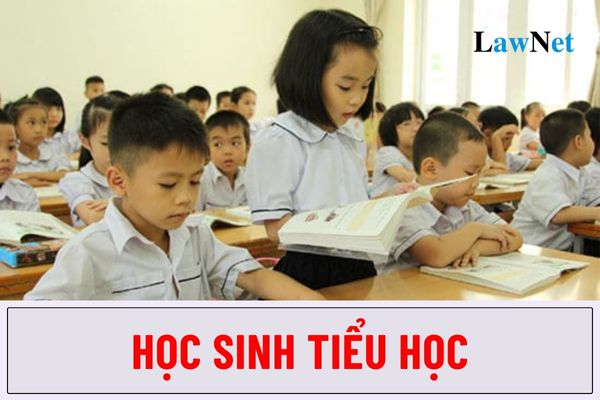What is the age of primary school students in Vietnam? What are the duties of primary school students in Vietnam?
What is the age of primary school students in Vietnam?
Based on Article 33 of the Charter of Primary Schools issued with Circular 28/2020/TT-BGDDT regarding the age of primary school students as follows:
- The age of students entering grade 1 is 06 years old and is calculated by year.
Children with disabilities, those with physical or intellectual developmental delays, children in areas with especially difficult socio-economic conditions, ethnic minority children, orphaned children without shelter, children returning from abroad, children of foreigners studying or working in Vietnam may enter grade 1 at an age higher than the regulated age but not exceeding 03 years.
In cases where children enter grade 1 beyond 03 years of the regulated age, it will be decided by the Head of the Department of Education and Training.
- primary school students at a higher age than the regulated age in cases of repeating grades, students in areas with especially difficult socio-economic conditions, students who are ethnic minorities, students with disabilities, students with physical or intellectual developmental delays, orphaned students without shelter, students returning from abroad and other cases as prescribed by law.
Thus, for primary school students in Vietnam, the age of students entering grade 1 is 06 years old and is calculated by year except for some special cases according to legal regulations where the age of primary school students can be more or less than this age.

What is the age of primary school students in Vietnam? What are the duties of primary school students in Vietnam? (Image from the Internet)
What are the duties of primary school students in Vietnam?
Based on Article 34 of the Charter of Primary Schools issued with Circular 28/2020/TT-BGDDT regulating the duties of primary school students in Vietnam as follows:
- Study and train according to the educational plan and school's regulations; have the awareness to self-study and train to comprehensively develop qualities and abilities according to the objectives of the elementary education program.
- Fully and effectively perform learning duties; know how to self-study under the guidance of teachers; actively participate in experiential activities, apply learned knowledge to real life; train physically, maintain personal hygiene.
- Be filial to parents and grandparents; respect and be polite to teachers and the elderly; be united, loving, and helpful to friends, younger siblings, the elderly, the disabled, and those in difficult circumstances.
- Comply with school rules, protect school property and public places; observe traffic safety regulations; maintain hygiene and protect the environment.
- Contribute to activities that build, protect, and promote the traditions of the school and local area.
What are the 05 rights of primary school students in Vietnam?
Based on Article 35 of the Charter of Primary Schools issued with Circular 28/2020/TT-BGDDT regulating 05 groups of rights of primary school students specifically including:
(1) The right to learn
- Students have the rights to be educated, to study to comprehensively develop and best utilize one's potential; attend a school or class that implements the elementary education program that is convenient for self-commuting in the residential area.
- Students may choose a school or transfer to another school outside the residential area, if the school has the capacity to accept.
- Students of primary school age returning from abroad, children of foreigners studying or working in Vietnam, children in difficult circumstances who have not attended school, if wishing to transfer to an primary school, will be organized by the principal to assess their level and place them in a suitable class.
- Disabled students are integrated into an primary school; provided with conditions for studying and training; educated and assessed according to their individual education plan.
- Students may shorten the time to complete the program, study at an age higher than the regulated age, extend the study period, or repeat grades.
- Students with good physical strength and early intellectual development may advance in grades within the educational level.
The procedures for consideration in each specific case are carried out as follows:
Parents or guardians of the student submit a petition to the school.
The school principal establishes a survey and advisory council, including: the principal or vice principal and representatives of the school’s parent council; the teacher of the class the student is attending, the teacher of the next class, the medical staff, the team leader.
Based on the survey results of the advisory council, the principal completes the dossier and reports to the Head of the Department of Education and Training for consideration and decision.
- Students with limited academic performance, who have been directly guided and helped by teachers, parents or guardians but still have not completed tasks, depending on the level of incompletion of learning and training tasks, the teacher will report to the principal for consideration of progression or repetition, and jointly with the family determine appropriate educational measures.
(2) The right to protection, care, respect, and fair and democratic treatment; ensured legitimate rights and interests; provided complete information about their own learning and training process; and ensured conditions regarding time, facilities, hygiene, and safety for learning and training.
(3) The right to participate in activities that promote individual abilities; to express opinions, personal aspirations.
(4) The right to receive scholarships and enjoy social policies according to regulations.
(5) The right to enjoy other rights as prescribed by law.

